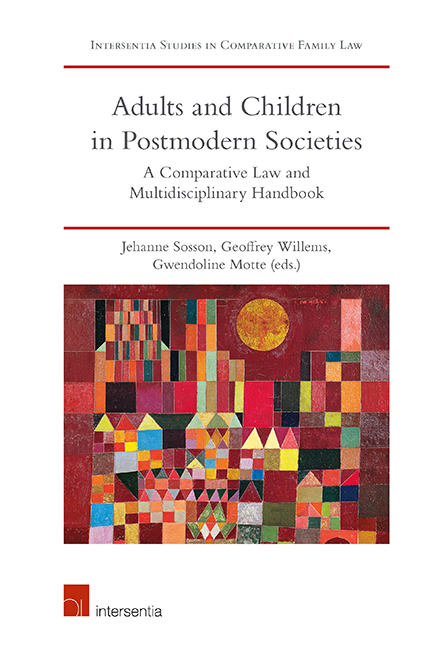Book contents
- Frontmatter
- Contents
- List of Cases
- List of Contributors
- Introduction
- PART I NATIONAL REPORTS ON LEGAL REGULATIONS OF RELATIONSHIPS BETWEEN ADULTS AND CHILDREN
- Questionnaire
- Models
- Algeria
- Argentina
- Australia
- Belgium
- Canada
- Democratic Republic of the Congo
- England and Wales
- France
- Germany
- Ireland
- Italy
- Japan
- The Netherlands
- Romania
- Spain and Catalonia
- Sweden
- Switzerland
- United States of America
- PART II INTERDISCIPLINARY APPROACH
- PART III INTERNATIONAL LAW INSIGHTS
- PART IV COMPARATIVE APPROACH
- General Conclusion: The Challenge of Transparent and Inclusive Parenthood/Parentality in a Pluralist and Cosmopolitan Context
- About the Editors
Japan
from PART I - NATIONAL REPORTS ON LEGAL REGULATIONS OF RELATIONSHIPS BETWEEN ADULTS AND CHILDREN
Published online by Cambridge University Press: 26 June 2019
- Frontmatter
- Contents
- List of Cases
- List of Contributors
- Introduction
- PART I NATIONAL REPORTS ON LEGAL REGULATIONS OF RELATIONSHIPS BETWEEN ADULTS AND CHILDREN
- Questionnaire
- Models
- Algeria
- Argentina
- Australia
- Belgium
- Canada
- Democratic Republic of the Congo
- England and Wales
- France
- Germany
- Ireland
- Italy
- Japan
- The Netherlands
- Romania
- Spain and Catalonia
- Sweden
- Switzerland
- United States of America
- PART II INTERDISCIPLINARY APPROACH
- PART III INTERNATIONAL LAW INSIGHTS
- PART IV COMPARATIVE APPROACH
- General Conclusion: The Challenge of Transparent and Inclusive Parenthood/Parentality in a Pluralist and Cosmopolitan Context
- About the Editors
Summary
Our legal system in general, as well as family law, has been influenced by laws from continental European jurisdictions, mostly French and German laws, particularly in the drafting process of our Civil Code in the late nineteenth century.
Our first ‘modern’ parent – child law, Civil Code of 1898, while drawing a great deal on continental European family law, nevertheless was centred on the ‘ie’ system. This literally means family or household, but rather stands for an idiosyncratic institution, that was a family law system in which a head of household enjoyed strong powers to control its members, and the status of the head of family was transferred to his eldest son, along with its patrimony. And the ‘ie’ system was not only a family system but was also a part of the Japanese political system. Namely, the relationship between the head and members within families was modelled on the dominance hierarchy between the Emperor (‘tennoh’) and his subjects. By privileging heads of family as such, the ‘ie’ system in turn legitimised the Emperor-centred political power structure, hence contributed to its stability. Besides, each ‘ie’ was charged to offer a safety net to its members against poverty and unemployment, which in effect took over the state's responsibility for social policy. Since Japan was a poor and undercapitalised nation, it might be said to serve for its economic development.
Having said that, we must emphasise that the ‘ie’ system embraced gender inequality, and the disparity between heads of family and its members; its innate character of slighting and sacrificing individuals for the interests of groups and the nation was condemned as one of the root causes of our society having driven itself into the tragedy of World War II (WWII). After the War, the new Constitution especially established the principles of gender equality and respect for individuals, which led to the fundamental amendment of the Civil Code regarding family and inheritance – mostly the repeal of provisions inherent to the ‘ie’ system, and the removal of eminent inequality among family members.
- Type
- Chapter
- Information
- Adults and Children in Postmodern SocietiesA Comparative Law and Multidisciplinary Handbook, pp. 385 - 416Publisher: IntersentiaPrint publication year: 2019

